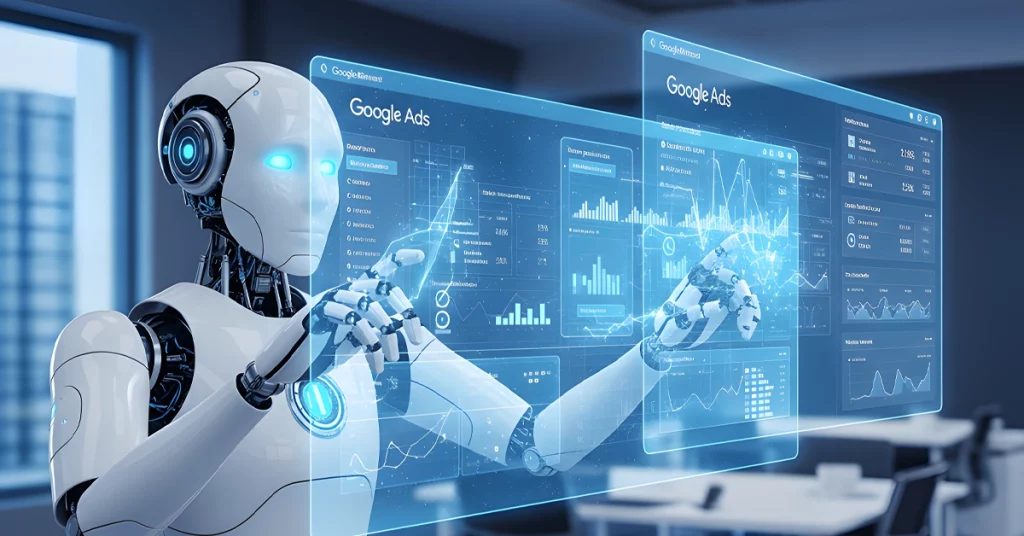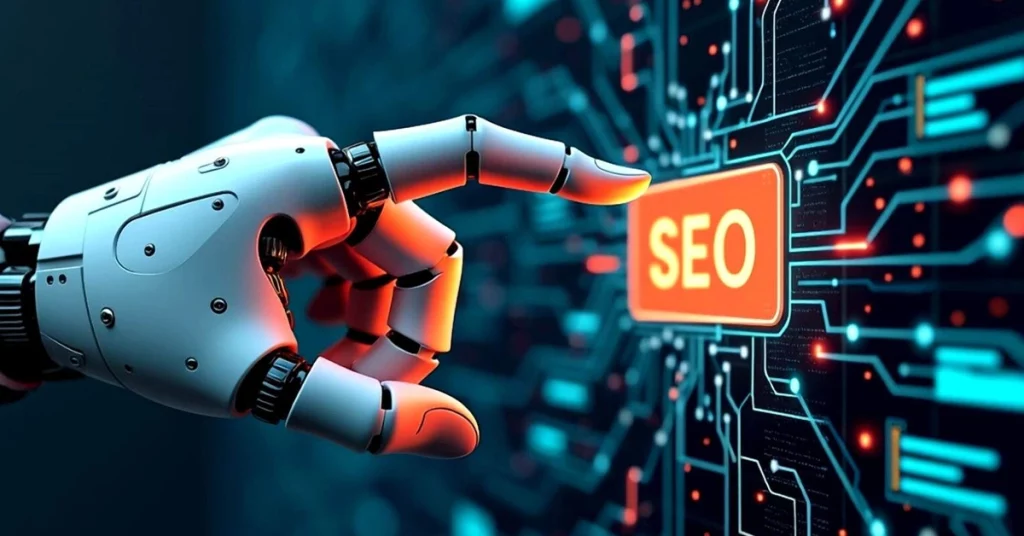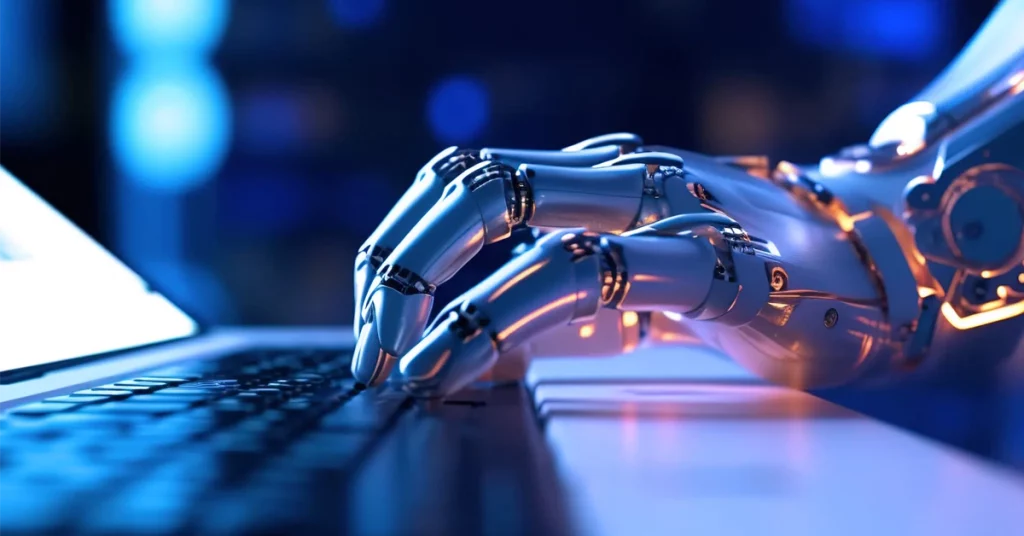rtificial Intelligence (AI) is no longer just a buzzword in the marketing world—it has become the driving force behind smarter strategies, deeper personalization, and faster execution. From digital marketing campaigns to Google Ads, from SEO optimization to content creation, AI is reshaping how businesses connect with their audiences and achieve measurable growth.
In this article, we’ll explore how AI is impacting four critical areas:
- AI in Digital Marketing
- AI in Google Ads & PPC
- AI in SEO
- Content Marketing & AI
AI in Digital Marketing
The Rise of AI in Marketing
The global AI in marketing market is growing at a rapid pace. Reports suggest it will exceed $100 billion by 2028, highlighting the massive shift toward automation and intelligent systems. Businesses are realizing that traditional methods of targeting and campaign management are no longer enough—AI offers scale, speed, and precision that humans alone cannot match.
Predictive Analytics & Personalization
One of the most powerful uses of AI is predictive analytics. By analyzing historical data, AI models can predict consumer behavior and anticipate what customers are most likely to do next. For example:
- An e-commerce site can predict which products a shopper might be interested in based on past purchases.
- A streaming platform can recommend movies and shows that perfectly match viewing habits.
AI also powers personalization engines. Instead of showing the same message to everyone, AI tailors ads, emails, and product recommendations to individual users. This level of personalization significantly boosts engagement and conversion rates.
Smarter Campaign Creation & Execution
Platforms like Omneky use AI to generate creative assets, design ad variations, and optimize campaigns across multiple channels. Marketers can launch, test, and refine campaigns much faster while ensuring they reach the right audience at the right time.
Benefits and Challenges
Benefits of AI in digital marketing include:
- Real-time insights and automation.
- Improved ROI through precise targeting.
- Scalability without additional manpower.
Challenges include:
- Concerns around data privacy.
- Over-reliance on algorithms.
- Maintaining an authentic brand voice while using AI tools.

AI in Google Ads & PPC
Smarter Bidding and Targeting
Pay-Per-Click (PPC) campaigns are highly competitive, and even small mistakes can waste budget. AI is changing this by introducing automated bidding strategies that adjust in real time to maximize conversions. AI analyzes huge sets of signals—time of day, device, user intent, and more—to determine the best bid for every impression.
AI also enhances audience targeting. Instead of broad targeting, advertisers can now focus on micro-segments based on detailed user behaviors and predictive scoring. This means your ads are shown to the people most likely to convert.
Creative Testing and Optimization
Traditionally, marketers needed to manually A/B test different ad copies, images, and formats. AI now automates this by creating multiple variations, testing them, and automatically selecting the best performers. This saves time and ensures ads are always optimized.
AI-Powered Avatars and Influencers
In markets like China, brands are already using AI influencers and avatars to promote products via livestreams. These AI presenters can run 24/7, deliver consistent messages, and engage thousands of users at once. For example, a printer brand used AI avatars to sell products online—and they outperformed human influencers in both engagement and conversions.
Balancing Automation with Authenticity
While AI makes PPC more efficient, brands must balance it with authenticity. AI may generate perfect ad copies, but if they lack emotional depth or cultural relevance, the audience may disconnect. A human touch is still necessary to maintain trust and relatability.

AI in SEO
The Evolution of SEO with AI
Search Engine Optimization (SEO) is undergoing a revolution. Traditional SEO was about keywords, backlinks, and content optimization. Now, with AI-driven platforms like ChatGPT and Google’s AI Overviews, businesses must optimize for AI-powered answer engines as well. This new approach is often called AI SEO, which combines:
- Conventional SEO (keywords, backlinks, on-page optimization).
- Answer Engine Optimization (AEO) (optimizing content to appear in direct answers).
- Generative Engine Optimization (GEO) (ensuring your brand is visible in AI-generated responses).
AI Tools for SEO
Marketers now rely on AI-powered SEO tools like:
- Surfer SEO – for content optimization and keyword suggestions.
- SEMrush – for competitive analysis and AI-based audits.
- Alli AI – for automated SEO adjustments across websites.
These tools analyze search intent, suggest content outlines, and even perform technical audits at scale.
How AI Impacts Search Visibility
Studies show that as much as 25% of organic traffic may decline as users shift from traditional search engines to AI-powered chatbots and assistants. This means businesses must adapt quickly by optimizing content for AI recommendations.
Best Practices for AI SEO
- Create conversational content that aligns with how users ask questions.
- Use structured data and FAQs to make your content easily digestible by AI engines.
- Maintain E-E-A-T (Experience, Expertise, Authoritativeness, Trustworthiness) to build credibility.
- Blend human and AI efforts: Let AI suggest ideas but always refine with human expertise.

Content Marketing & AI
AI as a Creative Partner
AI has become a game-changer in content marketing. From generating blog outlines to drafting social media captions, AI can help marketers create more content in less time. Tools like Jasper and ChatGPT assist with ideation, grammar improvements, and SEO-friendly structuring.
Personalized Content at Scale
AI enables hyper-personalized content experiences. For example:
- Email campaigns that adjust subject lines and body text for each user.
- Blog recommendations tailored to past reading history.
- Social ads customized to match browsing behavior.
This ensures every user feels like the content was made just for them, boosting loyalty and engagement.
Risks and Ethical Considerations
However, relying too heavily on AI for content can be risky. Some marketers misuse AI to mass-produce low-quality, clickbait content. This not only hurts brand credibility but can also trigger penalties from search engines. Google is increasingly strict about rewarding high-quality, human-edited content over purely AI-generated spam.
The Human + AI Workflow
The best approach is a hybrid model:
- Use AI for brainstorming, first drafts, and data analysis.
- Let human editors refine tone, add creativity, and ensure accuracy.
- Focus on storytelling, brand personality, and emotional depth—things AI cannot fully replicate.
This balance ensures efficiency without compromising quality.
Conclusion
Artificial Intelligence is no longer optional—it’s essential for modern marketing success. Whether it’s digital marketing campaigns, Google Ads, SEO, or content marketing, AI empowers businesses to be smarter, faster, and more precise.
But the key is balance. AI should be seen as a powerful partner, not a full replacement for human creativity and strategic thinking. Marketers who combine AI’s efficiency with human authenticity will not only stay ahead of competitors but also build stronger, lasting relationships with their audiences.
The future of marketing belongs to those who master this hybrid approach—where AI provides the insights and automation, and humans provide the vision and emotional connection.

